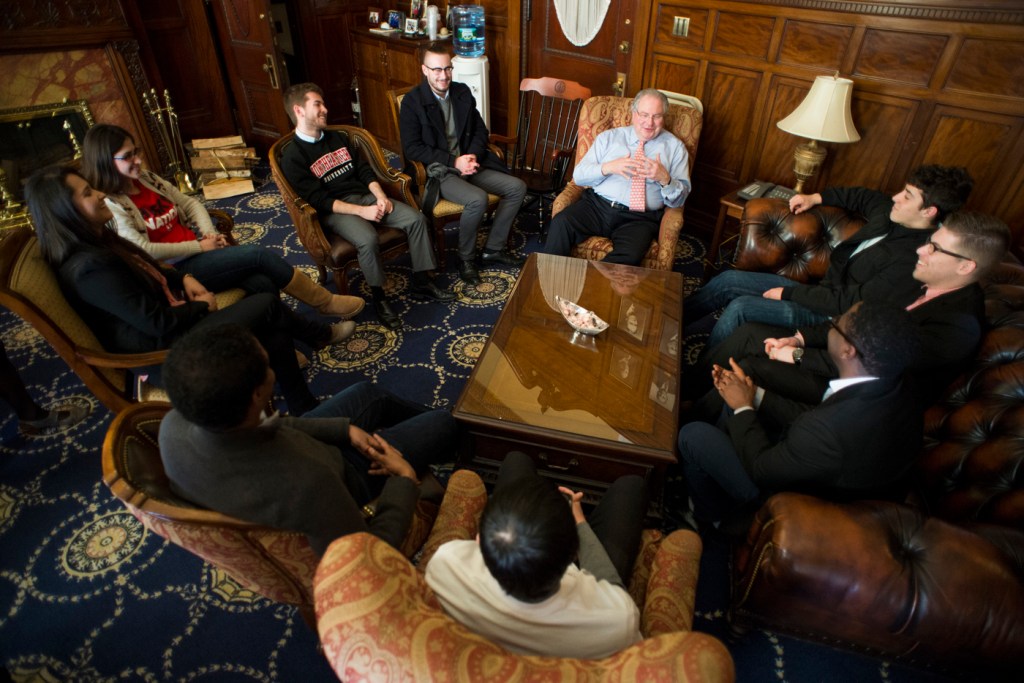Students advocate on Beacon Hill for need-based financial aid programs

Financial aid has transformed Leticia DoPrado’s life, providing her the opportunity to attend college, do co-op, and discover her passion for global talent management and employee development.
If not for need-based state and federal financial-aid programs, she would not have been able to transfer to Northeastern in the fall of 2012. If not for financial-aid programs, she would not be a fourth-year psychology major with a career plan and two co-ops under her belt—one at the Arbour Hospital, in Boston’s Jamaica Plain neighborhood, where she worked as a mental health associate, the other at TJX Companies, where she served as the global talent management research analyst.
“Financial aid helped me create dreams and then helped me achieve those dreams,” says DoPrado, S’15. “If it wasn’t for financial aid, I would most likely be cleaning houses with my mother.”
DoPrado—and a cohort of her Northeastern peers—discussed the life-changing value of financial aid during Student Financial Aid Day at the Massachusetts State House on Wednesday afternoon, meeting with state senators and representatives to advocate continued support of need-based financial aid programs.
The Association of Independent Colleges and Universities in Massachusetts organized the program, which drew some 200 students from 40 colleges and universities throughout the state. Northeastern’s Government Relations and Student Financial Services offices helped the students prepare for the event, as part of the university’s ongoing commitment to protect need-based state and federal aid for higher education.
Northeastern provided a record $221.4 million in institutional grants—not loans—for students in the 2014-2015 academic year, including need-based aid and other scholarships. Over the past six years, the university has increased financial aid at a rate more than double that of tuition.
James Marlowe, SSH’16, noted that his financial aid package played a vital role in his ability to transfer to Northeastern in the fall of 2013. “I could not have done this without the generosity of the financial aid department,” says Marlowe, a fourth-year political science major. “They were knowledgeable, passionate, and eager to help me with all my needs.”
When his dad passed away last year, Northeastern reevaluated his financial aid package and provided him with a response grant to continue studying at the university. “Northeastern was there for me,” he says. “Words cannot measure the appreciation I had for the university staff during my time of grieving.”
In the summer of 2014, he took advantage of the university’s co-op program and started working for the Massachusetts Firearms Record Bureau. The co-op, which gave him the opportunity to collaborate with local police departments and federal agencies, sparked his interest in working for the CIA. His more immediate plans include enrolling in Northeastern’s Security and Resilience Studies master’s program, which dovetails with his professional interests. All of this, he says, would not have been possible without financial aid.
On Wednesday, he, DoPrado, and their peers thanked lawmakers for their continuing efforts to increase funding for state financial aid. Last year, lawmakers voted to increase by $3 million the state’s funding of college grants and scholarships. “I was thrilled to have the opportunity to finally say ‘thank you,’” DoPrado says. “I felt that it was my duty to tell my story to senators and representatives, hoping it would enhance their understanding of the importance of financial aid in the lives of thousands of students who have great potential.”





